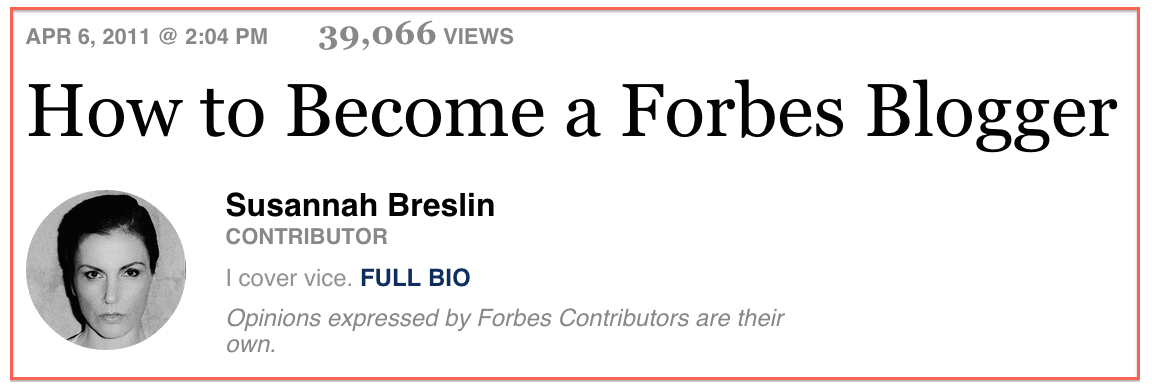Forbes bloggers, contributed content, and the decline of editing
 Content from an established media site is credible, right? Not when it’s contributed content. Media sites need content; people need to promote their ideas — the web makes it easy to connect them. The only thing lost is editorial judgment.
Content from an established media site is credible, right? Not when it’s contributed content. Media sites need content; people need to promote their ideas — the web makes it easy to connect them. The only thing lost is editorial judgment.
Unlike the native advertising I discussed yesterday, contributed articles are unpaid, unlabelled self-promotion. The person placing the article pays, not in cash, but in prose that fills space and bulks up a site.
I learned this firsthand when I promoting my second book, Empowered. The very well-connected PR folks at my employer found me 11 separate opportunities to write blog posts or articles promoting the book in business and trade publications. I was very happy with these placements. I got 11 articles published, and the publications did not edit a word, even though they were all promoting the same book on their respective sites.
We’re all used to this on blogger collective sites like Medium and Huffington Post. But among mainstream media outlets, the king of contributed content is Forbes, featuring hundreds of blogger “contributors” filling out its site. These posts receive hundreds or thousands of views, and there’s no discernible editorial oversight. Take the musings of Jacob Morgan, a guy whom I respect that writes about the future of work, but who can just post on Forbes his casual musings about a report he read and the rambling YouTube video he made about it:
A few days ago I put up a post on the Three Scenarios For The Future Of Work . . . It generated quite a good discussion online through various social channels so I wanted to put a video together that expands on some of the themes a little bit. Several readers encouraged me to do this and so…I did. . . . if you want to read more about each of these you can do so in the link above, or you can just watch the following video. I’m hoping this continues the conversation and expands on the topic a little bit. . .
Yup. That’s deathless prose from the once-traditional business magazine, Forbes. While they’re happy to profit from hosting unedited bloggers and traditional news on the same site, this cohabitation can be dangerous. Len Burman, a well-known economist who just happens to be my cousin, writes a Forbes blog called The Impertinent Economist. In 2012 he wrote an April Fool’s post suggesting that Mitt Romney had dropped out of the primaries and endorsed Rick Santorum. That was fine with Forbes until his post hit the top position on Google News and tens of thousands of people started clicking, imagining that a post from a Forbes blogger was actual news. Then Forbes yanked the post, because the flimsy membrane between their content and their contributors’ promotional writing had become hard to make out.
Forbes is not alone, it’s just the media outlet that’s best at this. You can contribute an Op-Ed to any mainstream newspaper. Fast Company’s site tops a Google search for contributed articles. Some outlets, like DigiDay, accept contributed content but edit carefully for quality and objectivity. Everybody does it.
And in case you’re wondering, of course I’ll be writing contributed articles to spread my point of view. I know how the system works. I’ll be taking advantage of it. Why not contribute some truth among the bullshit?
Lessons: Contributed articles are a significant part of the spread of unedited, poor quality content that we’re reading. Scrutinize everything, and recognize that all contributed articles include bias.
 In case you’re wondering, that graphic is from Anonymous showing hackers breaching the great firewall. Sort of like the contributed content breaching the Chinese wall between media content and advertising. Get it? Whatever. Source: Anonymous
In case you’re wondering, that graphic is from Anonymous showing hackers breaching the great firewall. Sort of like the contributed content breaching the Chinese wall between media content and advertising. Get it? Whatever. Source: Anonymous
Links please. I want proof.
Thanks Josh.
It took me a bit to figure that out about Forbes. Your post dovetails with a MOOC I’m taking: Trust and Verification in an Age of Misinformation (Knight Center for Journalism in the Americas at the University of Texas at Austin).